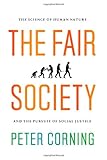
The Fair Society: The Science of Human Nature and the Pursuit of Social Justice
- 作者: Peter A. Corning
- 出版社/メーカー: Univ of Chicago Pr (Tx)
- 発売日: 2011/04
- メディア: ハードカバー
- クリック: 43回
- この商品を含むブログ (2件) を見る
This is a VERY dissapointing book. The author makes a series of extremely basic mistakes in his understanding of economics and Darwinian evolution. He makes the classic naturalistic fallacy. He has no consideration for emergent charcteristics. As a result, the analysis is bland. Because of his weak logic, he has to rely on "Big shots said so" quotes, which makes the book boring. And the reccomendation is truely childish.
FYI, I answered "No" to most of the questions at the end of Chapter 2. According to the author, this should mean that I have a quite accute sense of fairness, and that I should agree to everything the author says. Too bad, I didn't.
The author starts with the argument that the world today is too unfair and unequal. This is true. Although he adds nothing new to the argument, his points are valid. And he says that we should go for a more fair and equal society. Great. His points are well taken.
But after that, his arguments become completely unconvincing.
His first argument is that people are naturally hard-wired to favor fairness and equality. So, he says that we should go for a fairer society.
But this is a classic example of naturalistic fallacy. Just because people have a natural tendency to do something doesn't make it right, or desirable. Also, it begs the question; if people like equality and fairness so much, why isn't the world already so?
His answers are murky. He says that in order to survive, people had to be selfish at times. Oh. so I guess the fairness instinct isn't too strong after all.
He quotes game theory, like the ultimatum game, to show that poeple naturally LIKES cooperation and reciprocity. Yes, but then the question arises again. If they like it so much, why aren't we in a super fair society?
He doesn't have a convincing explanation. So he tries to place the blame on theories that promote selfishness and inequality. His culprits are, Evolutionary biology and economics.
This is where his complete misunderstanding shows up. Evolutionary biology doesn't promote or justify complete selfishness of the individual. On the contrary, it tells you that because of the selfishness at the gene level, the individual organism can and will show alturistic and cooperative behaviour. ANY Dawkins reader should understand that. The author doesn't. He claims that selfish gene idea justifies the selfishness in the individual organism... which is exactly the opposite.
He makes the same mistake with economics. Adam Smith said that when selfish individual interact to maximize their profit, it would lead to cooperation and reciprocity. Monopoly is bad, fair competiton among equal promotes the best results. Much of modern economics deals with how to make markets work efficiently, ie, create a foundation for FAIR competition. The author insists that it promotes greed, unfairness, screw-everyone-else attitude. It doesn't. Of course, how far regulations should go is a matter of debate, as the author points out in his comparison with communism... but he doesn't have any clear idea about the optimal level of regulation.
So, he doesn't have any coherent explanation about WHY the world is unfair and unequal. His argument is that when people started to save and hoard for the future, that is when unequality arose. Sound like Pol Pot. The author does point out issues about communism, but it's not really well thought out. The whole problem seems to be that there are greedy people. But according to the author, people should be naturally cooperative and fair. What gives?
In order to support the argument that cooperation is good, and alturism is great, He goes on to quote a huge number of philosophers and social thinkers. However, that's really pointless. Not many social theory or movements promote COMPLETE selfishness or unfairness. So if we take out bits and pieces, ANY social idea would fit into it. As a result, the book becomes a laundry list of social thinkers and nice quotes.
So, was there anything valid in his observations? Nothing much. Just a collection of nice quotes.
And then, what's his recommendation? He argues that if we all try to be a little more fair to each other and try a bit more toward a more equal society, then the whole society would be better.
First of all, this reccomendation is almost useless. What is more fair and equal at the individual level? Maybe I shouldn't haggle down prices too much at the market... but then that may lead to higher living costs that would hurt the poorer people. It's hard to tell the consequenses of individual actions.
And when it comes to collective action, the story is even unclear. As seen in the Adam Smith and Evolutionary idea, the selfishness of the individual can create cooperation and alturism in the society. And Keynes shows that when everyone tryes to hold on to a bit more cash, the collective result is a recession where everyone gets LESS cash. The point is that the characteristics of a society is often an emergent property, that could be totally opposite of the individual tendency. So if everyone tries to be more fair, would the society become more fair? Maybe not. You really can't tell.
I can't believe the author has a biology background, or that he can be a boss of some big institution. His understanding of everything in the book is so shaky, his reccomendation so unpractical and questionable, This book it totally useless. Not reccomendable.

山形浩生の「経済のトリセツ」 by 山形浩生 Hiroo Yamagata is licensed under a Creative Commons 表示 - 継承 3.0 非移植 License.